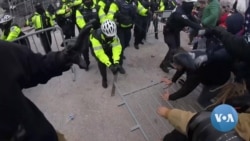Newly unveiled efforts to combat a growing domestic terrorism threat in the United States will have to find a way to overcome a major obstacle: carefully crafted campaigns by foreign countries and terrorist groups to incite violence.
The warning, from a senior U.S. Department of Homeland Security official, comes just a day after U.S. President Joe Biden issued his long-awaited National Strategy for Countering Domestic Terrorism, described by his administration as the first of its kind.
The Biden administration has downplayed direct links between violent extremists in the U.S. and those outside the country; one senior official noted that intelligence agencies “did not find a robust nexus between domestic terrorism and foreign actors.” Other officials caution, however, that is because the relationship does not follow a standard command-and-control model.
“A central element of the current threat is to take narratives that may influence violent behavior and get it out as broadly as you can,” Department of Homeland Security Counterterrorism Coordinator John Cohen told a webinar Wednesday hosted by The George Washington University Program on Extremism.
“We are seeing common narratives that seem to be resonating with individuals who are looking for extremist ideological beliefs to serve as the justification for violence being introduced by foreign nation-states, being introduced by foreign terrorist organizations,” Cohen said.
“There are threat actors, whether it’s foreign governments like Russia or Iran or China, or extremist thought leaders or terrorist groups that are taking advantage of that anger and the polarization of our society,” he said.
Concerns about foreign influences on domestic extremists in the United States are not new.
An unclassified assessment by the Office of the Director of National Intelligence, issued this past March, raised concerns about connections between white supremacists in the U.S. and those in other countries, noting small numbers of extremists have been traveling in an effort to forge stronger ties.
Cohen, though, warned those types of connections pale in comparison with those that are developing in the virtual environment.
“This is not a threat that we can investigate, or we can mitigate simply by looking at the physical activities of individuals who may be involved in preparing to conduct an attack,” he said. “We have to understand more about how extremist thought leaders and those working in a leaderless resistance structure will use these private and public online platforms to spread narratives broadly in the hopes that they will influence the behavior of disaffected, socially disconnected, angry individuals.”
Russia has been a particular concern for top U.S. officials.
During her confirmation hearing in January, Director of National Intelligence Avril Haines testified that the Kremlin was using active measures against the U.S. political right and the U.S. political left “to promote extremism, in a sense.”
Current and former officials, as well as analysts, have also warned Russia is actively cultivating a new generation of influence peddlers focused on building followers among the far right and far left.
As part of the new domestic terrorism strategy, officials have pledged to find ways to “counter the polarization often fueled by disinformation, misinformation and dangerous conspiracy theories online, supporting an information environment that fosters healthy democratic discourse,” according to a White House handout.
Officials also note that Washington has joined the Christchurch Call to Action to Eliminate Terrorist and Violent Extremist Content Online — an initiative named after the New Zealand city where a far-right gunman killed 51 people at two mosques in 2019.
But countering the threat from disinformation in particular will be difficult, according to Homeland Security officials, who point to the siege of the U.S. Capitol on Jan. 6, for which almost 500 people have been arrested.
“Now what united all of those people?” asked Cohen, who noted many of those at the Capitol that day were not affiliated with any groups.
“Among other things, they were all encouraged to come here by a disinformation narrative that the election was fraudulent and that had been stolen and that it was their responsibility to act,” he said.
And officials worry the spread and influence of disinformation could soon get worse as U.S. adversaries, whether countries or eventually criminal or terrorist networks, gain access to artificial intelligence, or AI.
“Artificial intelligence could generate disinformation scale in a way that brings real concern,” Anne Neuberger, White House deputy national security adviser for cyber and emerging technology, told a virtual forum last month.





